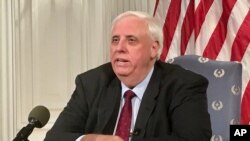The gunmen in two of the nation's most recent mass shootings legally bought their semiautomatic rifles after they turned 18. That's prompting Congress and some governors and state lawmakers to revisit the question of whether to raise the minimum age for purchasing such high-powered weapons.
Only six states require someone to be at least 21 years old to buy rifles and shotguns. Advocates argue that such a limit might have prevented the elementary school shooting in Uvalde, Texas, that left 19 children and two teachers dead and the racially motivated supermarket attack in Buffalo, New York, that killed 10.
Lawmakers in New York and Utah have proposed legislation that would raise the minimum age to buy AR-15-style rifles to 21. A similar restriction is expected to move as soon as next week in the U.S. House, where it has some bipartisan support, but the legislation faces uncertainty in the closely divided Senate.
Arkansas Governor Asa Hutchinson, a Republican who chairs the National Governors Association, said the idea should be up for discussion.
"I think you've got to be able to talk about the AR-15-style weapons, and whether that's an 18 or 21 age," Hutchinson told CNN this week. "You have to at least have a conversation about that."
But Hutchinson, who leaves office in January, isn't pushing for the limit in his own state. Any proposed gun restrictions there are unlikely to find support among Republicans who control the Legislature. Arkansas Republicans are echoing their party's calls at the national level to focus instead on beefing up school security or addressing mental health.
Partisan split
A recent survey of governors by The Associated Press highlighted the partisan split over whether the minimum age should be higher. Many Democratic governors who responded supported restrictions such as increasing the age to buy semiautomatic weapons. But only one Republican — Vermont Governor Phil Scott, whose state has a minimum age of 21 to buy guns, with some exceptions — supported such a move.
Gun control advocates say raising the age offers one of the clearest steps that could have stopped or prevented the most recent mass shootings. The Uvalde attacker, Salvador Ramos, bought the AR-15 he used shortly after he turned 18.
If Ramos hadn't been able to buy the weapon, "maybe he would have gotten the mental health treatment he needed and this never would have happened, or maybe someone would have called some signs out to law enforcement that this person was acting erratically," said Sean Holihan, state legislative director with the gun control advocacy group Giffords. "But it's clear if there had been a law in place where he would have been 21 years old, he wouldn't have been able to purchase that gun."
Federal law prohibits federally licensed dealers from selling handguns to anyone under age 21, but people age 18 to 20 can still buy handguns from unlicensed dealers in their state.
Florida is a rare example of a Republican-led state that took swift action on gun restrictions after a mass shooting. In 2018, weeks after the deadly shooting at Marjory Stoneman Douglas High School in Parkland, then-Governor Rick Scott signed legislation raising the minimum age to buy rifles from 18 to 21, along with a host of other school safety and gun control measures.
The law narrowly passed in both chambers of the GOP-controlled Legislature following intense lobbying from student survivors and grieving families, marking a moment of compromise in a state that previously shunned restrictions on firearms. Scott, a Republican, said at the time that the law balanced "our individual rights with the need for public safety."
Now a U.S. senator, Scott did not immediately return an emailed request for comment on whether such legislation should be implemented in other states.
New York bills
The Buffalo and Uvalde attacks are similarly prompting New York lawmakers this week to consider an age limit increase for buying semiautomatic rifles as part of a package of gun safety bills. Under the proposal, those age 21 and older who want to buy or possess a new semiautomatic rifle would have to obtain a license.
"New York already has some of the toughest gun laws in the country, but clearly we need to make them even stronger," Democratic Governor Kathy Hochul said. "New Yorkers deserve to feel safe in schools, in grocery stores, in movie theaters, in shopping malls and on our streets — and we must do everything in our power to protect them."
A proposal in Utah that would raise the minimum age to buy any firearm to 21 is more of a long shot in that state's Republican-controlled Legislature.
"If you are not able to consume alcohol, why should you be able to buy a gun?" Democratic Senator Derek Kitchen said of his proposal.
The age provision in the bill before the U.S. House has some bipartisan support, but it remains unclear which aspects of the legislation will pass and be taken up in the Senate. Any measure there needs support from at least 10 Republicans to pass.
The House bill also would make it a federal offense to import, manufacture or possess large-capacity magazines and creates a grant program to buy back such magazines. It encourages safe firearms storage and builds on the executive branch's ban on bump stock devices and so-called ghost guns made from 3-D printers.
Several Republicans have pointed to a ruling by a federal appeals court panel that found California's ban on the sale of semiautomatic weapons to adults under 21 is unconstitutional. Republican governors who decline to pursue the age increase also cite the political reality in their GOP-controlled legislatures.
Why try?
West Virginia Governor Jim Justice this week said he supports raising the minimum age for buying an AR-15-style rifle to 21 but isn't proposing such a change in his state.
"First of all, do I really feel like an 18-year-old ought to be able to walk in and buy an assault weapon? I don't," the Republican governor told reporters this week.
He appeared pessimistic about that or any other gun control measure gaining traction in his state.
"I can call 1,000 special sessions," he said. "And if all I'm doing is calling 1,000 special sessions for people just to come and talk and get up on a soap box and get nothing done, why?"







